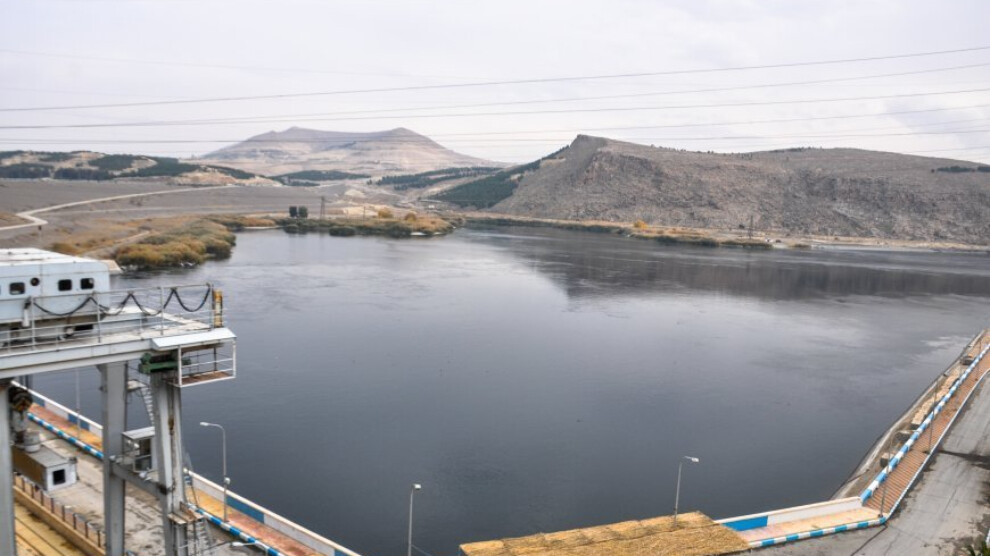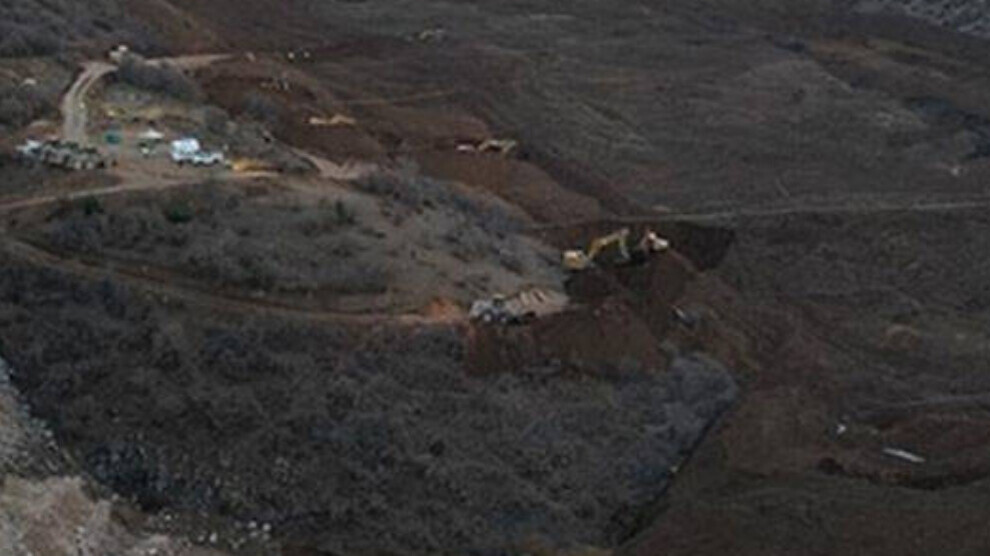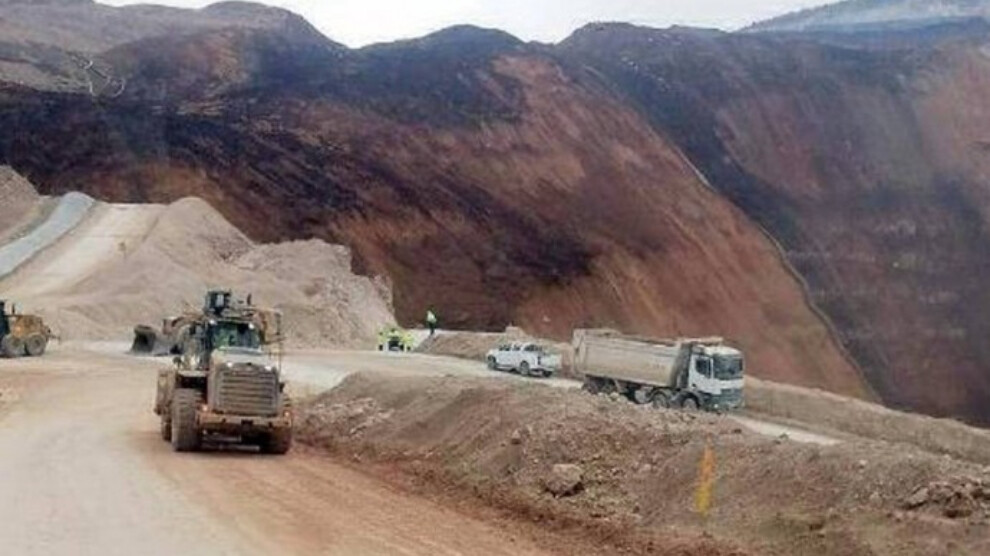Following the allegations that poisonous water mixed with the Euphrates water after the soil collapse in Erzincan, the Euphrates Canton Executive Council established a committee to analyse the water.

ANF
KOBANÊ
Wednesday, 6 March 2024,
On February 13, the Çöpler gold mine in the İliç district in the province of Erzincan was the scene of a catastrophe. A huge slope of rubble contaminated with cyanide slid down and buried several workers. At least nine workers still remain trapped under the earth. A toxic dust cloud rose up, threatening the surrounding settlements. The disaster is expected to affect the Euphrates basin and the Tigris and all of Mesopotamia.
Following the disaster, images of cyanide water mixing into the Euphrates River were circulated on social media. According to reports, the poisonous water mixed with the river water and spread over a long area with the current due to the AKP government's failure to take precautions.
In the face of the allegations, the Democratic Autonomous Administration of North-East Syria took action to analyse the water flowing into the Syrian part of the Euphrates River. Since the Euphrates River water is an important source of drinking and agricultural irrigation water in the region, concerns have increased.
The Euphrates Canton Executive Council established a committee to analyse the water.
A total of 8 members, 2 from the Environment Committee, 2 from the Local Administrations Committee, 2 from the Health Committee and 2 from the Executive Committee, were elected to the committee established under the name of Euphrates Canton Emergency Situations Committee.
Following the appointment of the Committee, work was initiated. According to initial analyses, no toxic substances were found in the river water.
The members of the committee stated that there is a possibility that the poisonous substances will be transferred to Northern and Eastern Syria in the coming days and that they will carry out analyses continuously and inform the public about the issue.
Kahraman: Iliç mine disaster will have serious consequences for at least a century
Tuğba Kahraman from Polen Ekoloji, said that the ecocide in Iliç covers a very large area, and added that “cyanide and heavy chemicals will mix with the Euphrates as the result of a disaster that will have consequences for at least a century."

ANF
NEWS DESK
Sunday, 25 February 2024,
Tuğba Kahraman from Polen Ekoloji answered ANF's questions about the before and after of the disaster in the Iliç mine. Nine workers who were trapped under the rubble of the Çöpler Gold Mine in Iliç in the province of Erzincan could not be reached, and the search efforts stopped.
Various expert reports have been published regarding the mining accident in Iliç. From the first day, it was claimed that waste from Iliç did not reach the river and precautions were taken. First of all, if we put all these explanations aside, is it possible to calculate the estimated destruction toll of the mining disaster?
It is very difficult to predict the toll of an ecocide of this magnitude. The destruction covers a very large area. There is a destruction that will affect the Euphrates basin and the Tigris and all of Mesopotamia. Cyanide and heavy chemicals will mix with the Euphrates. The consequences of the disaster will last at least 100 years... Considering that two million cubic meters of this toxic soil were scattered here and there, mixing with the groundwater through rainfall, and that the chemical mass weighed approximately 27 million tons, it is very difficult to imagine the size and destruction of the massacre. People, animals, soil, our waters will die. Unfortunately, the responsible companies and their collaborators will continue their way with ostensible fines and trials.
The air analysis carried out by the Ankara Branch of the Chamber of City Planners using photographs and satellite images revealed that it is almost impossible for the chemicals not to mix with the waters of the Euphrates River. It was also stated that Keban, Karakaya and Atatürk Dam were at risk. What danger does this pose?
As environmental engineers and other experts in the field point out, cyanide and other chemicals remain suspended in the air when mixed with the air through evaporation. They can be directly in contact with living creatures in that environment through inhalation, and if inhaled, they will cause public health and environmental health problems. If the chemicals affect the soil, animals and people will be affected through the plants growing there. This will affect the entire endemic structure, the health of living beings and human health through the food chain. COPD and cancer-like diseases will gradually emerge in subsequent generations. In the case of leakage into groundwater and water leakage, the width of the basin is very bad in terms of the scale of the disaster.
It is clear that the responsibility lies primarily with the Ministry of Environment, as permission was given to expand capacity despite the previous infiltration. Now new mining areas are being opened. What can we expect?
One of Turkey's largest gold mines is not going to give up so easily on the benefits it gets from favourable agreements with the government. The number of EIA positive reports and capacity expansion permits for all mines, not just Iliç, is increasing day by day. The ostensible closure of the mine in the previous leak in Iliç and the efforts to minimize the seriousness of the incident by saying that this disaster was in reality just a landslide, are the result of the agreement of the capital and the state. This result paves the way for other disasters.
To what do you attribute the ability of international monopolies to carry out, in countries like Turkey, many practices that are otherwise normally prohibited?
Turkey has become the dumping ground of the EU. The ease with which cyanide and asbestos can be used is an indication of how capital's greed for profit is superior to the right to life of humans and all living things, and how deep Turkey's relationship with international capital actually is. With the practice of ecological struggle that has developed in the last few years, there is more awareness that the problem stems from capitalism. The massacre can be stopped by developing these practices and increasing the struggle.
Miners buried in cyanide-laced landslide at gold mine in Erzincan
Several mine workers were buried in a landslide at a gold mine in the province of Erzincan. The DEM party blames the disaster on the negligence of the AKP/MHP government and the unscrupulousness of the mining companies.

ANF
ERZİNCAN
Wednesday, 14 February 2024,
A serious landslide occurred at the Çöpler gold mine in the İliç district in the province of Erzincan on Tuesday. A huge slope of rubble contaminated with cyanide slid down and buried several workers. According to the Ministry of the Interior, nine of the 667 workers in the mine are unaccounted for, and search efforts continue. It remains unclear whether this figure is correct and whether the 667 officially employed people are all those who were at the site of the disaster at the time. The governor's statement that the landslide was caused by the dumping of overburden points to negligence as the cause of the accident. According to the Ministry of Justice, four public prosecutors have begun investigations into the matter.
Governor conceals the toxicity of the earth
While the governor of the province claimed that it was soil under which the workers were buried, environmental initiatives are warning of the highly toxic earth. In view of the disaster, the İliç Environmental Platform stated: "We have said that the disasters in İliç will not end. The governor of Erzincan says it's a landslide, no, it's the cyanide-contaminated overburden, millions of tonnes of toxic soil!"
The spoil is highly toxic, so, according to mining engineers, the rescue workers would have to wear protective clothing to avoid being poisoned. Images from the scene show that this, however, is not the case. Apparently, fine cyanide dust was released during the landslide and formed a toxic cloud that spread over the surrounding area. Cyanide is still used in many places as a means of extracting gold from the ground by amalgamation. This causes massive environmental problems.
Departures to Erzincan banned, 4 detained
In the meantime, Tunceli Governorate "banned" the departure of the provincial organisation of Peoples' Equality and Democracy Party (DEM Party), Socialist Party of the Oppressed (ESP) and Dersim Environment Association members from Dersim due to disaster in Erzincan. 4 members of the Human Rights Association (IHD) who wanted to go to Erzincan were detained.
DEM Party Dersim Provincial Co-Chair Özcan Gürtaş stated that they were stopped at the exit of the province and said: "They justified the decision of Erzincan Governorate to ban entry and exit to the city. They stated that no one would be allowed to enter the scene of the incident in İliç. They cited the Tunceli and Erzincan Governorate decisions on leaving Dersim and entering Erzincan. They said they would intervene if we insisted on going."
DEM party holds the government partly responsible
"The government and its capitalists are responsible for every loss of life in İliç," said the DEM Party Commission for Ecology and Agriculture. "This is a massacre with a number of people responsible! The Canadian company Anagold as the operator of the mine, Çalık Holding as one of the shareholders of the mine and the AKP government and its bureaucrats, who turned a blind eye to this blatant disaster, are successively and equally responsible for this catastrophe. As a result of the landslide, carcinogenic cyanide was released into the air, water and soil. The effect of cyanide, which is poisoning the water resources, the entire soil and the atmosphere in the region, will continue for a very long time. The AKP government, which has always been at the service of capital and corporations, has not even taken into account that the active Bingöl-Yedisu fault line is located in the region where the Çöpler complex mine is operating. A favourable Environmental Impact Assessment (EIA) was carried out for this mining project in 2008. In addition, the capacity was increased twice with new EIA reports in 2014 and 2021. In 2019, the mine was converted from cyanide production to production with 39 types of chemicals plus sulphuric acid plus cyanide. In August 2023, Anagold received approval to expand the open pit within the mine site by a further 5.83 hectares, with the decision being 'EIA not required'."
DEM Party: "Close the mine - hold those responsible to account"
Calling for the mine to be closed, DEM Party stated: "The mining licence for this mine, which continues to pose a threat to nature and the people in the region, must be revoked immediately and the mine closed. Urgent steps must be taken to remove the heavy metals and toxic chemicals that have been released into the air, water and soil as quickly as possible. Effective measures must be taken to achieve this. Immediate action must be taken to protect local residents, neighbouring communities and the environment affected by the cyanide cloud created by the soil spill. This incident is a massacre! As the DEM party, we will continue to pursue the issue until all those responsible for this massacre are held accountable."
Previous toxic disaster caused by gold company
The US-Canadian gold company Anagold, which operates the mine together with Çalık Holding, made the headlines back in 2022 when up to 20 tonnes of cyanide and large quantities of sulphuric acid flowed into the Euphrates. The company denied this and claimed it was only eight kilograms. Although this was a huge ecological disaster, the company's licence was not revoked. Instead, it was sentenced to a small fine of 16.4 million lira (far less than one million euros).
A gold company with AKP involvement
Instead, the company made record savings through the state. As part of a tax amnesty on 12 March 2023, the Group was waived taxes, interest and penalties amounting to USD 7.2 million. Instead, the company only had to make a cash payment of USD 1.4 million instead of USD 8.6 million. A paltry sum in view of the USD 1.5 billion in income from the mine between 2020 and 2023, including USD 334.6 million in net profit. This support for an extremely dangerous mine cannot be explained by neoliberal policies alone. If we take a closer look at the mine's co-operator, Çalık Holding, the background becomes clearer.
Çalık Holding is responsible for around 20 per cent of the mine and is one of the fastest growing companies under the AKP government. Thanks to privatisations, TOKİ (Housing Development Administration) tenders, agreements and favourable credit conditions, the holding company has grown rapidly in many sectors from energy to telecommunications, finance to textiles, construction to media. According to its annual reports, the holding company increased its equity approximately ninefold from 2012 to 2020, from 1 billion 600 million liras to 13 billion 900 million liras. Ahmet Çalık, the owner of the holding company, is listed in the 2021 Forbes list with a fortune of 1.5 billion dollars. In the Forbes list of the "100 richest Turks" of 2020, Çalık ranks 15th. At the same time, Çalık Holding has smuggled millions past the tax authorities in offshore companies. The holding company is known for its closeness to the AKP.
Close ties between the Erdogan family and Çalık Holding
In 2010, the Çalık Group company DAPRAŞ received a subsidy certificate for an investment totalling 14.8 billion liras for a refinery project in Ceyhan. Erdoğan's son-in-law, Berat Albayrak, was appointed General Manager of Çalık Holding in 2007.
The holding company has won numerous tenders in the telecommunications, construction, energy and mining sectors and was also the winner of the December 2007 tender of the seized media group Sabah-ATV. All participants withdrew from the tender and the only bid came from the holding company, whose general director at the time was Berat Albayrak. During its entry into the media sector, the group received a loan of 750 million dollars from public banks. The sale of Sabah-ATV to Çalık Group was a turning point in the media sector. After that, the process of transferring the majority of mainstream media to government-affiliated companies began. On 20 December 2013, Çalık Holding transferred its subsidiary Turkuvaz Medya to the Kalyon Group and ended its activities in the media sector.
A marriage of state and capital
The connection to the AKP was particularly evident at the wedding of the son of Ahmet Çalık, the chairman of Çalık Holding. Mehmet Tevfik Göksu, Mayor of Esenler, performed the wedding ceremony. The former Prime Minister of Turkey, Binali Yıldırım (AKP) was the best man. Former intelligence chief and current Foreign Minister Hakan Fidan, Defense Minister Hulusi Akar and many other high-ranking AKP government officials attended the wedding. The bride was Öznur Çalık, who has been a member of parliament for the AKP for four terms.
No comments:
Post a Comment